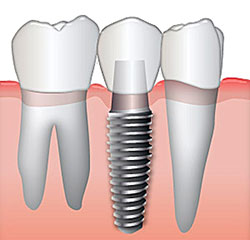Losing one or more teeth can affect more than just your physical appearance. It can also affect your speech, your food choices and your body’s overall state of health. Within a year of losing a tooth, you’re likely to lose up to 25 percent of the supporting structure in your jawbone. Thus, it’s important to have some type of procedure done to fill in the empty space.
Here’s a brief look at your options:
Implants
Implants are one of the most common tooth replacement options. They involve inserting a post into the supporting bone structure to prevent neighboring teeth from drifting out of position. A replacement tooth can then be fitted to the top of each post. Implants are typically made of titanium and other metals that are harmless to the human body.
Although implants are a popular option, they’re not suitable for everyone. Since surgery is required, the patient has to be in good health and must have enough bone left to support the implant. If not, surgery will be necessary to build the area back up. Even after the implants are in place, the patient will have to make regular visits to their dentist and commit themselves to a daily care regimen.
Bridges
A bridge is another option that makes use of surrounding teeth to support an artificial tooth. It involves shaving down and contouring the two adjacent teeth so that caps, called “crowns,” can be fitted over them. A single piece is made up of the two crowns with the false tooth in the middle, forming a “bridge” between the other two teeth. This is a great option to consider if you already have problems with those other teeth. Bridges can be either fixed or removable, depending on the patient’s mouth and needs.
Dentures
Dentures are false teeth that are relatively quick to fabricate and easy for the patient to remove. They can be eitherpartial or complete, depending on how many teeth need to be replaced and where they are located. Partial dentures can be created for situations that call for one to a few teeth. They come mounted to a plastic or metal framework and are designed to fit comfortably around the patient’s other teeth. Complete dentures are for patients who are missing all their teeth. Dentures should be removed nightly to allow the gums to breathe, as well as for cleaning.
The best tooth replacement option for you is best determined by consulting with your dentist and discussing your needs and unique situation. There are many factors to consider, including treatment costs, goals and numerous other concerns you might have. The most important thing to remember is that there’s no need to suffer from the mounting effects that may result from missing teeth.










